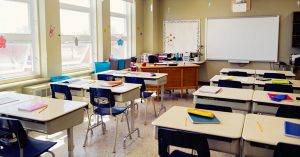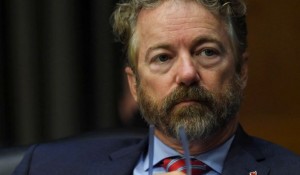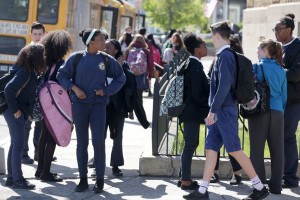Kentucky Supreme Court unanimously strikes down school choice law
 FRANKFORT, Ky. — Kentucky’s so-called school choice program, which garnered controversy and a lengthy legal challenge, violates the state constitution, Kentucky’s Supreme Court ruled Thursday.
FRANKFORT, Ky. — Kentucky’s so-called school choice program, which garnered controversy and a lengthy legal challenge, violates the state constitution, Kentucky’s Supreme Court ruled Thursday.
House Bill 563, dubbed the Education Opportunity Account Act or the school choice bill, was ruled unconstitutional and struck down by the Kentucky Supreme Court in a unanimous decision affirming Franklin Circuit Judge Phillip Shepherd’s ruling.
The law’s opponents objected to using the state tax code to aid private education. The measure’s supporters said tax credits didn’t amount to government spending, even if they decrease revenues.
Eddie Campbell, president of the Kentucky Education Association, a labor association representing tens of thousands of educators, hailed the ruling as a victory for public schools.
“We simply can’t afford to support two different education systems — one private and one public — on the taxpayers’ dime, and this ruling supports that concern,” he said in a statement. “This decision is proof that the courts continue to serve as an important check against legislative overreach.”
Read the entire article here….
Opinion: After two decades of studying voucher programs, I’m now firmly opposed to them.
By Joshua Cowen
In recent years, nearly half of all states have created publicly funded private K-12 tuition plans, collectively known as school vouchers.
This summer, advocates of these plans are pushing to expand their reach, boosted by the Supreme Court’s ruling in Carson v. Makinthat states permitting vouchers may not exclude religious schools.
Arizona just expanded its already large voucher program; in Michigan, former U.S. Education Secretary Betsy DeVos and allies have proposed a voucher scheme modeled on plans elsewhere. In June, GOP supporters in Congress reintroduced legislation to create federal funding for voucher programs.
Vouchers are dangerous to American education. They promise an all-too-simple solution to tough problems like unequal access to high-quality schools, segregation and even school safety. In small doses, years ago, vouchers seemed like they might work, but as more states have created more and larger voucher programs, experts like me have learned enough to say that these programs on balance can severely hinder academic growth — especially for vulnerable kids.
Will Texas State Leaders Continue to Propose Failed Voucher Schemes?
By Charles Luke, Ed.D. – Coordinator, Coalition for Public Schools
 Earlier this week, Texas Lt. Governor Dan Patrick released his 2022 Interim Legislative Charges for thirteen different legislative committees around a number of issues. Interim charges serve as a task list for legislators to review current legislation and a blueprint for what they might consider during the next legislative session. Patrick’s charges cover everything from border security to the electric grid to education as well as many other items.
Earlier this week, Texas Lt. Governor Dan Patrick released his 2022 Interim Legislative Charges for thirteen different legislative committees around a number of issues. Interim charges serve as a task list for legislators to review current legislation and a blueprint for what they might consider during the next legislative session. Patrick’s charges cover everything from border security to the electric grid to education as well as many other items.
In public education, Patrick charged Senators with a number of issues related to parent empowerment; the effects of COVID-19 on the teacher workforce; student discipline; the content of library books; vaping; school bonds; charter schools; and property tax exemptions, while tasking them to monitor a variety of current legislation.
Will the Supreme Court Defund Public Schools?
By Charles Luke, Ed.D. – Coordinator, Coalition for Public Schools
 The Supreme Court of the United States (SCOTUS) is set to hear Carson v. Makin today (December 8, 2021) – a potential landmark case about the separation of church and state. Their decision could alter a fundamental founding principle of the country.
The Supreme Court of the United States (SCOTUS) is set to hear Carson v. Makin today (December 8, 2021) – a potential landmark case about the separation of church and state. Their decision could alter a fundamental founding principle of the country.
The nine justices will hear an appeal by the families of a lower court ruling rejecting their claim that the Maine program singles them out for religious discrimination in violation of the U.S. Constitution including its First Amendment protection of the free exercise of religion. The families want taxpayer dollars to send their children to two Christian schools that integrate religion into their classrooms and have policies against gay and transgender students and staff. While the families are focused on the free exercise clause, many are concerned that providing taxpayer funding for the families would violate the establishment clause of the First Amendment.
Trump opens up federal dollars for private school vouchers amid pandemic
The White House said that the order would give states new flexibility in how they use federal block grant programs.
President Donald Trump on Monday signed an executive order allowing states to use their share of money from a federal anti-poverty program to provide vouchers to help “disadvantaged families” pay for private school tuition, homeschooling or other educational expenses during the pandemic.
The move comes after the $900 billion coronavirus relief deal, H.R. 133 (116), that Trump signed on Sunday excluded many of the school choice provisions that his administration and GOP lawmakers had sought to include in that sweeping legislation.
Judge strikes down DeVos plan to boost pandemic relief for private schools

A federal judge on Friday ruled that Education Secretary Betsy DeVos’ effort to boost the amount of emergency pandemic relief that flows to private school students is illegal and struck down the policy.
U.S. District Judge Dabney Friedrich, an appointee of President Donald Trump, ruled that DeVos ran afoul of the CARES Act when she required public schools to send a greater share of pandemic assistance to private school students than is typically required under federal law.
The judge sided with the NAACP, which had brought the legal challenge against DeVos’ policy, criticizing it as a ploy to divert emergency aid away from needy public schools toward more affluent private-school students.
Private and Charter Schools Got $6 Billion in Paycheck Protection Program Aid, Study Says
Private sch ools as well as charter schools have received $6 billion in federal coronavirus aid in the form of forgivable loans, according to a study by a nonprofit group.
ools as well as charter schools have received $6 billion in federal coronavirus aid in the form of forgivable loans, according to a study by a nonprofit group.
The estimate published Tuesday by the Committee for a Responsible Federal Budget, which focuses on federal fiscal issues, notes that this Paycheck Protection Program funding is a little less than half of the roughly $13 billion in separate aid provided to states and K-12 school districts for K-12 under the CARES Act, which President Donald Trump signed into law in late March.
The Paycheck Protection Program, which provided loans to businesses and nonprofit entitities that can be converted to grants, was funded by the CARES Act and a subsequent virus relief package enacted in April. Traditional public schools are not eligible to apply for PPP money.
Sen. Rand Paul filed S.4432 on August 4, 2020. The bill, cited as the “Support Children Having Open Opportunities for Learning Act of 2020” or the “SCHOOL Act of 2020”would provide federal funds to be distributed through an education savings account directly to students. The bill would supersede any statutory prohibitions of the allocation of federal funds. Should the bill pass the U.S. Senate it is unlikely that it will pass the U.S. House. It is another example of the continued push for vouchers that we see emerging from the federal government at this time.
Read the entire article here …
Sen. Rand Paul files federal voucher bill
Sen. Rand Paul filed S.4432 on August 4, 2020. The bill, cited as the “Support Children Having Open Opportunities for Learning Act of 2020” or the “SCHOOL Act of 2020”would provide federal funds to be distributed through an education savings account directly to students. The bill would supersede any statutory prohibitions of the allocation of federal funds. Should the bill pass the U.S. Senate it is unlikely that it will pass the U.S. House. It is another example of the continued push for vouchers that we see emerging from the federal government at this time.
The Coalition for Public Schools submits virtual schools network letter to Texas education commissioner
AUSTIN, Texas – In response to suggestions that legislatively imposed restrictions to the Texas Virtual Schools Network the Coalition for Public Schools has submitted a letter to Texas Commissioner of Education Mike Morath providing recommendations to enable online learning during and after the COVID-19 pandemic. The letter discusses the effectiveness of current online offerings and offers suggestions for moving forward including extending current online provisions for public schools and convening a broad group of stakeholders to consider solutions before the 87th Texas Legislature convenes in January of 2021.
You can read the entire letter at the link below:
Judge rules Tennessee’s voucher law is unconstitutional
NASHVILLE, Tenn. (AP) — A Tennessee judge on Monday ruled that the state’s much-debated school voucher program is illegal and cannot be implemented despite education officials receiving thousands of applications from parents hoping to use public tax dollars on private school tuition.
Davidson County Chancellor Anne C. Martin said in her order that the voucher law, which Gov. Bill Lee signed into effect last year, violated the Tennessee constitution’s “home rule.” Lee’s administration had backed the legislation during his first year as governor, gaining just narrow support from the GOP-controlled Statehouse and strong opposition from Democratic members and public education advocates.
Read the entire article here . . .
The Danger Private School Voucher Programs Pose to Civil Rights
 Since Betsy DeVos became the secretary of the U.S. Department of Education, she has continued to push for a federally funded private school voucher program. These programs currently exist in 29 states and provide state support—through direct payments or tax credits—for students to attend private schools. (see text box) Voucher supporters such as Secretary DeVos describe vouchers as providing parents with freedom of choice in education. However, some states have historically used private school voucher programs as a means to avoid racially integrating schools, as occurred during the 1950s and 1960s.1 More recently, evidence has shown that these programs are not effective at improving educational achievement.2
Since Betsy DeVos became the secretary of the U.S. Department of Education, she has continued to push for a federally funded private school voucher program. These programs currently exist in 29 states and provide state support—through direct payments or tax credits—for students to attend private schools. (see text box) Voucher supporters such as Secretary DeVos describe vouchers as providing parents with freedom of choice in education. However, some states have historically used private school voucher programs as a means to avoid racially integrating schools, as occurred during the 1950s and 1960s.1 More recently, evidence has shown that these programs are not effective at improving educational achievement.2

